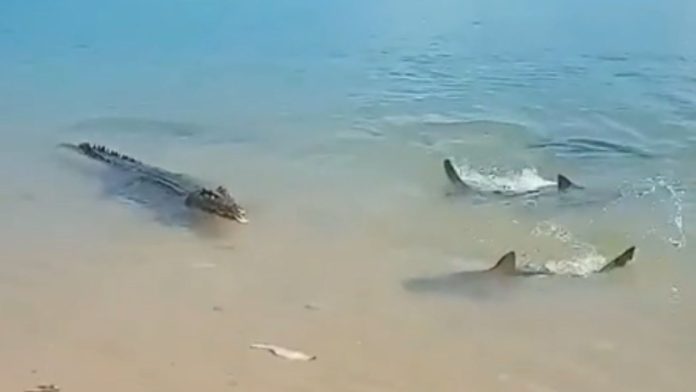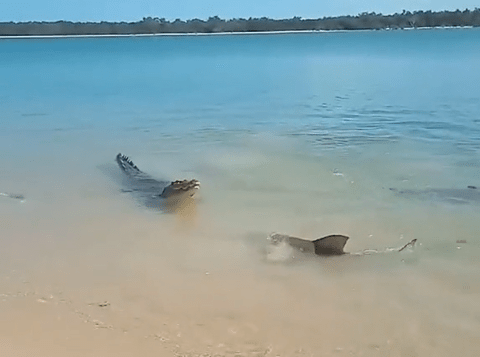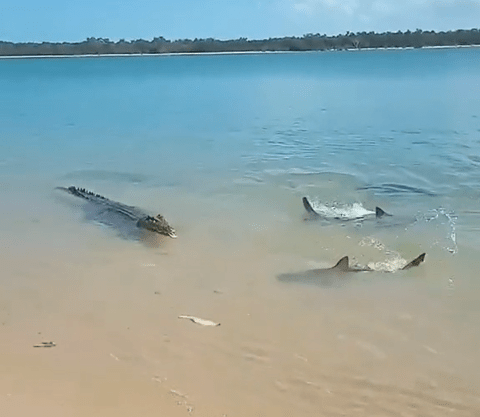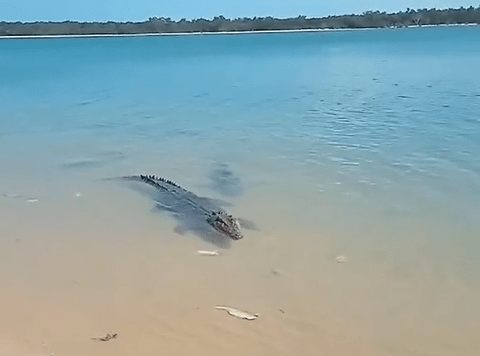Crocodile vs. Sharks: The Epic Showdown in Queensland Waters!
In a jaw-dropping encounter, a lone crocodile found itself in a fierce confrontation with a gang of sharks, showcasing the raw power of nature in a dazzling display of survival. This jaw-dropping moment unfolded along the stunning coastal waters of North Queensland, Australia.
This intense incident kicked off when a large crocodile, on the hunt for its next meal, stumbled upon a spirited pack of sharks defending their territory. The confrontation was like something straight out of a wildlife documentary, with the sharks making quick, darting movements and splashes in an attempt to intimidate the hungry reptile.
**
Crocodile’s Brave Resistance Against Sharks
**
Undeterred by the sharks’ aggressive tactics, which included a dramatic tail splash in the shallow waters, the brave crocodile seemed to dig in and fight back! This confrontation escalated into a tense stand-off where the mighty reptiles clashed over their rightful claim to the territory.
In a surprising twist, the sharks eventually retreated! It appeared as if they had suffered a humiliating defeat against this fierce competitor. The crocodile’s resilience captured the attention of local fisherman Vincent Bates, who witnessed the action firsthand. He shared the exhilarating footage online, titling it, “Crocodile and sharks battle for territory.”
**
Community Reactions to the Clash of Titans
**
As expected, social media erupted with enthusiasm over this jaw-dropping encounter. Comments poured in, with many viewers dubbing the battle a ‘crazy fight.’ One astute observer pointed out that the sharks’ aggression may have stemmed from food scarcity, stating, “The problem is overfishing in deeper waters by huge ships, forcing sharks to seek food in shallower areas.”
Laura Sandeman, a marine biologist with Human Society International, echoed these sentiments. She noted, “This certainly seems to be an instance of predators looking for an opportunity to get a quick meal with a fishing boat in the water.” This incident shines a light on how changes in marine ecosystems impact the natural behavior of these apex predators.
**
Why Crocodiles Target Shallow Waters for Food
**
Crocodiles are known to typically hunt in shallow waters, where they can easily ambush their prey. However, battles like these between crocodiles and sharks are a rare sight. It brings to mind another similar event from 2021, where a crocodile confronted two sharks engaged in a comparable dance of survival. And let’s not forget the curious spectacle taught us something about predator behaviors.
In another remarkable incident, an alligator was seen being bitten by a shark near a South Carolina beach, exhibiting the unpredictable nature of wildlife interactions. Such events showcase the delicate balance within ecosystems, and how the search for food can drive these creatures into unexpected confrontations.
Fascinating Facts About Saltwater Crocodiles
The saltwater crocodile holds the title for the largest crocodile species in the world and is also the largest living reptile on the planet. Males can reach astonishing lengths up to 23 feet, while females usually max out around 10 feet.
Interestingly, the world’s largest crocodile, named Cassius, makes Queensland his home, residing in a wildlife park.
To communicate, saltwater crocodiles produce a variety of sounds including barking, hissing, growling, and chirping, showcasing their complex social behavior.
As one of Earth’s oldest creatures, saltwater crocodiles have a lineage that spans over 240 million years, surviving since the age of the dinosaurs. Their evolution has been remarkably stagnant, maintaining a similar body structure for the last 200 million years.
These remarkable reptiles breed during the wet season, with females laying up to 50 eggs in nests they build along riverbanks. The incubation period for their eggs lasts about three months, but only about 1% of hatchlings survive to adulthood due to various predators and environmental factors.




